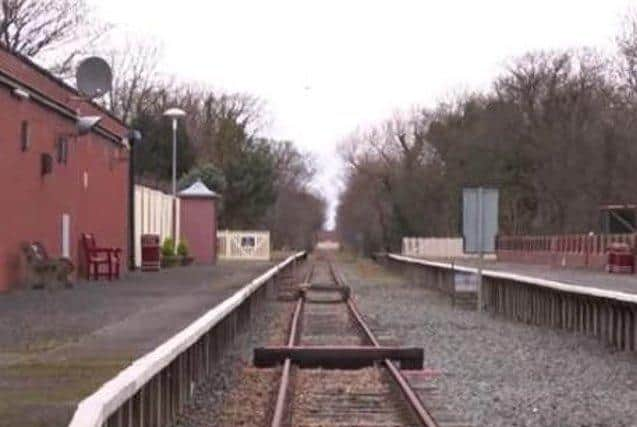Call for an end to "computer says no" response to Lancashire transport bids
and live on Freeview channel 276
That was the message from Lancashire County Council’s cabinet member for transport to a gathering of northern leaders who had met to discuss the future of travel across their collective patch.
County Cllr Charlie Edwards told the Transport for the North (TfN) annual conference that places like Lancashire had to prove that their bids for government cash were “credible” and that they had the capacity to deliver them.


Advertisement
Hide AdAdvertisement
Hide AdHe added: “When we combine those two, then we can go to the government and say what we need is certainty [and] a long-term financial solution.
“When [the government] is making these decisions, it can't be done based on just a financial algorithm - because when the North asks for something using a financial algorithm [originating from] London, computer says no.
“And computer doesn't just say no once, it says no time and time again - and that cannot be the way in which we deliver [transport projects].”
County Cllr Edwards was speaking at a panel discussion at the conference exploring how the North of England can secure transport investment.
Advertisement
Hide AdAdvertisement
Hide AdTfN set out a strategic plan in 2019 in which it made the case for £2.3bn worth of government transport funding for the North every year for the next three decades. The money would be used to deliver schemes including Northern Powerhouse Rail - improving East-West links across the North - as well as better integration between different modes of travel, decarbonisation of public transport and a strengthening of the road network.
Speaking to the Local Democracy Reporting Service after the meeting, County Cllr Edwards said it was important to “reimagine the relationship between Lancashire and the rest of the North of England” so that the county is “ a big player at the table, [whose] voice is heard". He added that there was no shortage of potential projects to be funded in Lancashire.
“I see £1bn worth of infrastructure investment for Lancashire. I see [rail] improvements in Morecambe, Skelmersdale, the Skipton to Colne line, Fleetwood to Poulton, the South Fylde Loop and Clitheroe to Hellifield.
“Every single scheme has local importance, but together they have a regional and national importance [by] making sure our tourist hotspots are fully integrated into the rail system, getting cars off the road and getting to net zero carbon,” County Cllr Edwards said.
Advertisement
Hide AdAdvertisement
Hide AdHe had earlier told the panel discussion that the best way to secure initial government funding was to maximise passenger numbers and so ultimately make Lancashire’s rail services “self-sustainable” - and he also called for fewer restrictions on how money from Whitehall could be spent.
Iain Craven, finance director for TfN, said that in order to fulfil the vision of the organisation's transport plan in a “meaningful way”, it would have to be funded by central government.
It is claimed that the blueprint to transform travel across the North could lead to £100bn in economic growth and the creation of 850,000 jobs by 2050, based on a £70bn investment over that period.
Sir Roger Marsh, chair of the NP11 umbrella group for local enterprise partnerships across the North, said at the conference discussion that the plan could have wider societal benefits and help to reduce “deprivation and poverty”.
Advertisement
Hide AdAdvertisement
Hide Ad“The transport piece is...an important ingredient to the recipe that delivers a net-contributing North rather than a continually-dependent North,” he told delegates.
Meanwhile, Emma Antrobus, North West director of the Institute of Civil Engineers, called for a confirmed “pipeline” of transport infrastructure projects so that constructors could ensure they had the capacity to make them a reality.
“We have companies that want to take on staff, but...you don't take on staff unless you've got work. We have such an opportunity to really grow our skills base, to drive up productivity around the construction industry and the North - and the country as a whole.
“But you can't do it without certainty,” Ms. Antrobus added.
WHAT’S COMING DOWN THE TRACK FOR LANCASHIRE?
Advertisement
Hide AdAdvertisement
Hide AdLancashire is awaiting the results of a series of bids to the government’s Restoring Your Railway Fund, which wound see the Department for Transport finance 75 percent of the cost – up to £50,000 – of transport studies and business cases for proposals to reinstate long-redundant rail infrastructure which could lead to the:
***reconnection of Rawtenstall and Manchester
***re-opening of Midge Hall station in South Ribble
***reintroduction of the Burscough Curves (to directly connect Preston and Southport by train)
***creation of a new station at Coppull in Chorley
***the installation of improvements in the Pendle area
Earlier successful bids were made to develop business cases for the reintroduction of passenger services between Clitheroe and Hellifield – and for the exploration of freight options on the route – and to enhance existing passenger services between Preston and Blackpool South.
A feasibility study completed earlier this year is expected to form the basis of a submission to the Restoring Your Railways Fund to kickstart the process of reopening the Fleetwood to Poulton line.
Separately, Lancashire County Council last week submitted a strategic outline business case to the government for a new station in Skelmersdale to reconnected the town to the rail network.
Comment Guidelines
National World encourages reader discussion on our stories. User feedback, insights and back-and-forth exchanges add a rich layer of context to reporting. Please review our Community Guidelines before commenting.